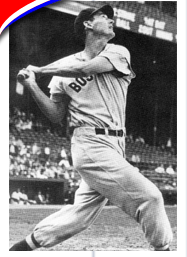|
|
|
YEAR
|
G |
AB |
H |
2B |
3B |
HR |
TB |
R |
RBI |
BB |
AVG |
|
1939
|
149 |
565 |
185 |
44 |
11 |
31 |
344 |
131 |
145 |
107 |
.327 |
|
1940
|
144 |
561 |
193 |
43 |
14 |
23 |
333 |
134 |
113 |
96 |
.344 |
|
1941
|
143 |
456 |
185 |
33 |
3 |
37 |
335 |
135 |
120 |
145 |
.406 |
|
1942
|
150 |
522 |
186 |
34 |
5 |
36 |
338 |
141 |
137 |
145 |
.356 |
|
1946
|
150 |
514 |
176 |
37 |
8 |
38 |
343 |
142 |
123 |
156 |
.342 |
|
1947
|
156 |
528 |
181 |
40 |
9 |
32 |
335 |
125 |
114 |
162 |
.343 |
|
1948
|
137 |
509 |
188 |
44 |
3 |
25 |
313 |
124 |
127 |
126 |
.369 |
|
1949
|
155 |
566 |
194 |
39 |
3 |
43 |
368 |
150 |
159 |
162 |
.343 |
|
1950
|
89 |
334 |
106 |
24 |
1 |
26 |
216 |
82 |
97 |
82 |
.317 |
|
1951
|
148 |
531 |
169 |
28 |
4 |
30 |
295 |
109 |
126 |
144 |
.318 |
|
1952
|
6 |
10 |
4 |
0 |
1 |
1 |
9 |
2 |
3 |
2 |
.400 |
|
1953
|
37 |
91 |
37 |
6 |
0 |
13 |
82 |
17 |
34 |
19 |
.407 |
|
1954
|
117 |
386 |
133 |
23 |
1 |
29 |
245 |
93 |
89 |
136 |
.345 |
|
1955
|
98 |
320 |
114 |
21 |
3 |
28 |
225 |
77 |
83 |
91 |
.356 |
|
1956
|
136 |
400 |
138 |
28 |
2 |
24 |
242 |
71 |
82 |
102 |
.345 |
|
1957
|
132 |
420 |
163 |
28 |
1 |
38 |
307 |
96 |
87 |
119 |
.388 |
|
1958
|
129 |
411 |
135 |
23 |
2 |
26 |
240 |
81 |
85 |
98 |
.328 |
|
1959
|
103 |
272 |
69 |
15 |
0 |
10 |
114 |
32 |
43 |
52 |
.254 |
|
1960
|
113 |
310 |
98 |
15 |
0 |
29 |
200 |
56 |
72 |
75 |
.316 |
| TOTAL |
2292 |
7706 |
2654 |
525 |
71 |
521 |
4884 |
1798 |
1839 |
2019 |
.344 |
|
|
|
| He was the
consummate craftsman, a man who mastered the science and intimate
subtleties of the strike zone, perhaps better than anyone before
or since. So keen was the batting eye of Theodore Samuel Williams
that if he took a pitch, umpires invariably called it a ball.
In 1941, Joe DiMaggio made the headlines with a 56-game hitting
streak, but during the same period, "The Splendid Splinter"
outhit DiMaggio .412 to .408. Williams produced 185 hits that
season in 456 official at-bats, and that translated to a .406
average. No one has reached the .400 plateau since. Like DiMaggio's
streak, it is a standard against which the best players are
measured. The last game and the last at bat, Williams hit a
home run. And even the Boston stubborn fans, who had never thought
Williams to be a favorite to them, had to rise to their feet
in tribute. |
|








